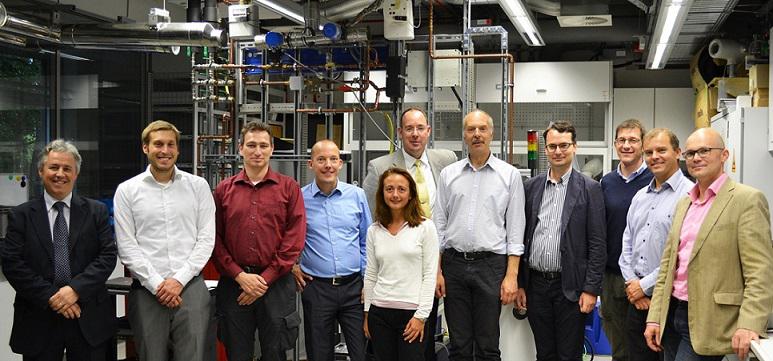Scientists develop maintenance-friendly CHP plants and 'Ikea-style' handbooks

Oldenburg. At the NEXT ENERGY EWE Research Centre, work has begun on the D2Service ("Design of 2 Technologies and Applications to Service") research project, which is funded by the European Union. Under the leadership of the Oldenburg-based energy researcher, a method is being developed jointly with project partners from five countries that will simplify maintenance of different kinds of combined heat and power plants (CHP plants) based on fuel cells. The primary objective is to noticeably reduce costs and labour for repair work, thereby increasing the distribution of energy-efficient fuel-cell-based technology throughout Europe.
We want to simplify and standardise the construction of two different CHP systems
Some of the CHP plants currently in operation are equipped with new components not be used for usual heating systems so far. On top of this, many of them were developed for specific fuel cell systems. As a result, only a few technicians are trained for each particular type of system so repairs can involve long journeys and high costs. This is where D2Service comes in, as project manager Tobias Thomsen explains: "We want to simplify and standardise the construction of two different CHP systems available on the market as far as possible, so that important components are easy to exchange at a later date. At the same time, we are developing graphical operating instructions that explain the maintenance process to non-specialist installers step by step – very clearly, in 'IKEA' style."
Evaluation phase
An evaluation phase at the start of the project will provide the blueprint. During this time, all seven project partners will analyse the CHP plants and their components, for example concerning maintenance and repair work, reliability, error statuses and spare parts. This will be based on the experience gathered in the various national and international field tests. From the findings it will then be possible to derive the necessary steps for development, which will later form the basis for the redesign of both plants.
Develop components that are as similar as possible
The real challenge lies in this adaptation of the design of the units, as Thomsen is keen to emphasise: "We want to develop components that are as similar as possible for both systems; however we are dealing with a polymer electrolyte and a solid oxide fuel cell, i.e. two different technologies." As a result, not every component can be standardised, so alongside the joint developments (e.g. in water treatment and in the desulphurisation unit), the manufacturers are also carrying out individual design adaptations. NEXT ENERGY is developing test procedures based on real data from previous field tests to characterise these optimisation processes.
Evaluation of CHP systems using time-lapse tests
Another focus of the project by the NEXT ENERGY researcher is the evaluation of CHP systems using time-lapse tests developed in-house. These simulate a year of use in the laboratory within a few weeks, enabling more reproducible development cycles within the shortest period possible. The data obtained will be used to recommend further optimisation of thermal management and of electrical and thermal energy yield.
Field test under real conditions
The optimised service features will be tested in a field test under real conditions in the last phase of the project. Six units of each type of plant will be put into operation in private and public facilities at several European sites. All relevant data will be recorded for evaluation and should verify the components' extended durability outside laboratory tests. In addition, NEXT ENERGY will test the acceptance and user-friendliness of the manuals with installers who have no prior technological expertise, and will continue to improve them.
Project partners
The three-year D2Service research project (Grant Agreement Number 671473) is funded through the Horizon 2020 European research programme and the Fuel Cells and Hydrogen Joint Undertaking (FCH-JU) with a total of around three million euros. In addition to NEXT ENERGY, the other project partners involved are the manufacturers Dantherm (Denmark) and SOLIDpower (Italy), the component developer Bosal Emission Control Systems (Belgium), the energy services provider Energy Partner (Italy), the energy supplier British Gas Trading Limited (UK) and the Zentrum für BrennstoffzellenTechnik (Germany).
